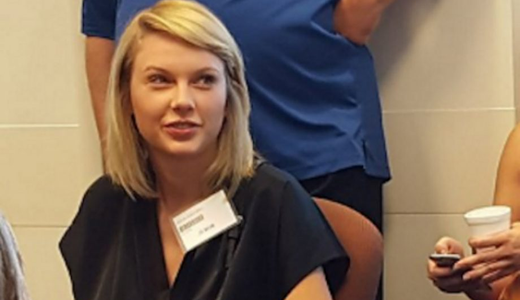If you follow pop culture happenings, you likely saw the story this week about singer Taylor Swift testifying at a trial in Denver. The case involved a 2013 meet-‘n’-greet in which then DJ David Mueller allegedly groped the singer’s backside. Mueller lost his job over the incident, and actually sued Swift for $3 million. (Swift countersued for a symbolic $1.) The jury in the first case ruled in Swift’s favor earlier this week.
Now, sordid trials involving celebrities are hardly a new thing. But some believe that Swift’s unflinching and detailed testimony describing the event will empower other women who’ve been sexually assaulted. Among many other things, Swift told Mueller’s lawyer, “I’m not going to allow you or your client to make me feel in any way that this is my fault. Here we are years later, and I’m being blamed for the unfortunate events of his life that are the product of his decisions—not mine.”
Writing about Swift’s testimony, The New York Times reporter Melena Ryzik said, “Among those paying attention to the trial: lawyers and others who work with sexual assault survivors, who found in Ms. Swift’s moment on the stand a potent public example of how to persevere in a fraught situation, and perhaps a way to shift the national conversation around sexual assault.”
In a statement after the verdict, Swift said, “I acknowledge the privilege that I benefit from in life, in society and in my ability to shoulder the enormous cost of defending myself in a trial like this. My hope is to help those whose voices should also be heard. Therefore, I will be making donations in the near future to multiple organizations that help sexual assault victims defend themselves.”
The issue of body shaming and its influence on people’s lives also made headlines this week. In an extensive interview with Vogue, actress Jennifer Aniston said she doesn’t think things are getting much better since she published an essay on the subject about a year ago: “I think the problem is the tabloids and the gossip columns taking the human body and putting it in a category. They’re either fat-shaming, or body-shaming, or childless-shaming. It’s a weird obsession that people have and I don’t understand exactly why they need to take people who are out there to entertain you, and rip them apart and bully them? Why are we teaching young women this? It’s incredibly damaging. I was finally like, This has just got to stop!”
Actress Raven-Symoné told People that if she hadn’t been told she was overweight as a child star, “I probably wouldn’t have so many mental issues.” In 2015, Raven-Symoné said on The View that others’ comments about her weight started when she was just 7 and starring on The Cosby Show. “And I remember people would be like, ‘You can’t eat that. You’re getting fat!’ I’m like, ‘I’m 7! I’m hungry!’ ”
Elsewhere this week, a new survey by the Kinsey Institute indicates that using smartphones to send sexual images or texts—sexting—has become “normal” behavior for adults around the world. The survey polled more than 140,000 people from 198 countries regarding their use of technology, and it found that 67% of adults internationally (and 74% of Americans) have sent sexually oriented messages. “Sexting may be becoming a new, but typical, step in a sexual or romantic relationship,” said Kinsey researcher Amanda Gesselman. (For more on helping your teens navigate this increasingly prevalent and problematic issue, check out Focus on the Family’s article, “Sexting: Why Parents Should Care and What They Should Do About It.”)
Outspoken pro-life actress Patricia Heaton blasted CBS news this week in the wake of that network’s report that Iceland has almost “eliminated” Down syndrome there … because virtually all women who have a fetus diagnosed with it have an abortion. The network tweeted the story, saying, “Iceland is on pace to virtually eliminate Down syndrome through abortion. #CBSNOA learns more, tonight at 10pm ET/PT.” Heaton responded via Twitter, “Iceland isn’t actually eliminating Down Syndrome. They’re just killing everybody that has it. Big difference.” Her post resulted in a raft of tweets on her page from parents of Down syndrome children praising her countercultural stance on the issue.
If you’re wondering what teens are into these days, the 2017 Teen Choice Awards gives us at least one set of answers to that question (this year, at least). Movies teens chose include: Wonder Woman; Spider-Man: Homecoming; Guardians of the Galaxy Vol. 2; Beauty and the Beast; Everything, Everything and Finding Dory. TV shows: Riverdale, The Vampire Diaries, The Flash, Fuller House, Family Guy and The Voice. Actors and actresses getting the nod include: Chris Pine, Chris Pratt, Dwayne Johnson, Zac Effron, Gal Gadot, Zoe Saldana, Emma Watson, Melissa Benoist and Lucy Hale. Musical acts: Harry Styles, Calvin Harris, Shawn Mendes, Ariana Grande, Carrie Underwood, Camilla Cabello, Beyoncé and Fifth Harmony. (For a complete list of winners, click here.)
Finally, some scientists are suggesting that posting a lot of photos to social media could correlate with depression. And if you’re looking for a list of popular social media sites teens flock to other than Facebook, you can find 17 of ’em listed here.






Recent Comments